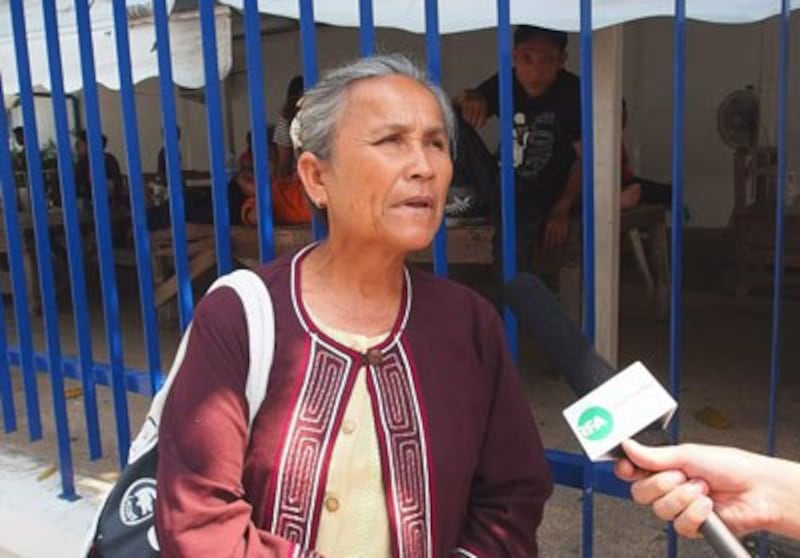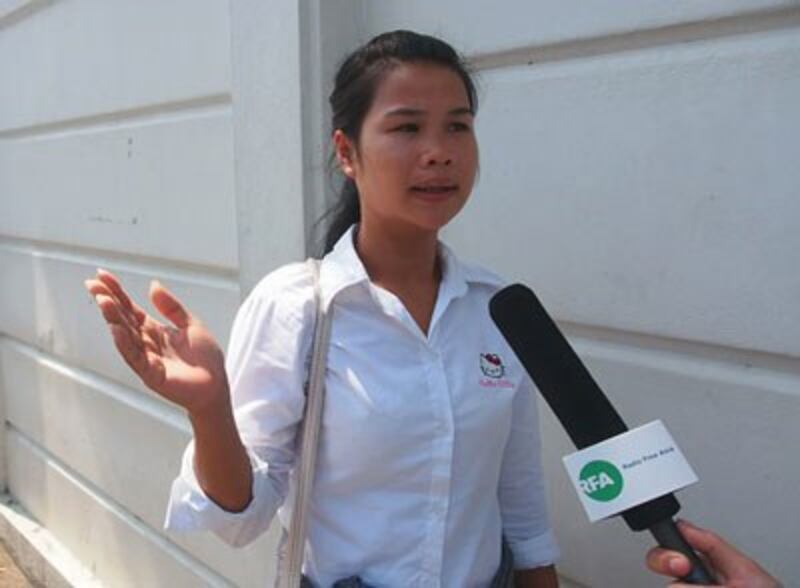The relatives of two Lao human trafficking victims rescued from Thai fishing boats in Indonesia earlier this month have appealed to the Lao Embassy in Thailand for assistance in returning the men to their homes in Laos.
The two were among a group of eight Lao victims rescued from captivity on Indonesia’s Ambon Island nearly three weeks ago, along with 455 migrant fishermen from Myanmar and 94 from Cambodia, according to Reuters news agency.
Patima Thungprachayakul of the Thai civil group Labor Rights Promotion Network Foundation (LPN) tracked down Naed Phommachack, the mother of 40-year-old victim Lang Phommachack, and Hongthong Phouheuanghong, the sister of 31-year-old victim Thoei Phouheuanghong, in Laos and brought the two women to the Lao Embassy in Thailand’s capital Bangkok on Wednesday to plead their case.
She told RFA’s Lao Service that after meeting with officials from the Lao Embassy and verifying the identities of the two men, the ambassador had pledged to assist in their repatriation by coordinating with embassy officials in the Indonesian capital Jakarta.
“The ambassador is cooperating whole-heartedly,” she said.
“He has taken up this issue and will coordinate with his counterpart, even though the Lao Embassy in Thailand does not play a major role in helping Lao victims in Indonesia. Still, I believe they will work together with Lao Embassy officials in Jakarta.”
Patima Thungprachayakul said that if the two embassies were able to confirm the nationality of other Lao victims in Indonesia, LPN would bring them to Thailand and then send them home to Laos.
Earlier this week, she said that because there had never been a case where a Lao trafficking victim was repatriated from Indonesia to Laos, there was no process in place to do so.
She said LPN was coordinating with several human rights groups to locate the relatives of the trafficking victims and was in the process of trying to assist other Lao nationals who are believed to be held captive by fishing boats.
An official at the Lao Embassy in Bangkok declined to give an interview to the media when contacted about the trafficking victims.
Missing relatives

Naed Phommachack, from Sakor village in Savannakhet province’s Xayburi district, told RFA her son had volunteered to work on a Thai fishing boat in Indonesia years ago, but she did not realize he had fallen victim to human trafficking until he was rescued and sent to a shelter.
“My son was on a fishing boat, but I didn’t know that he had disappeared,” she said.
“When he called me, he said he was on Ambon Island, but he never said why because he did not want to upset me. I asked why he didn’t return to the mainland, and he said his boss hadn’t returned yet. After he was rescued, he said he fell into hardship [and could not come home].”
Hongthong Phouheuanghong, from Khonkhuang village in Borikhamxay province’s Pakkading district, told RFA that her brother had disappeared in 2009.
She said she learned from the Thai media that her brother was one of victims rescued in Indonesia earlier this month and that he had also contacted her asking for help from Thai authorities.
“My brother used to plant tobacco in our village. Our neighbor had married into a Thai family and they persuaded him to go [work on a fishing boat],” she said.
“We don’t know anything more than what we have seen on the news. I want my brother to come home because our parents are so worried.”
Hongthong Phouheuanghong said her family was overjoyed to learn that her brother was not dead and expressed hope that the Lao Embassy and LPN would help him and other victims to return home.
Thai trafficking

LPN estimated that between 3,000 and 4,000 trafficking victims remained to be rescued after being enslaved on Thai boats in Indonesia—many of whom are trapped on islands in the region, while others are fearful of leaving and surrendering years of back wages that were never paid to them.
Last June, the U.S. downgraded Thailand in its annual report on human trafficking and Thai authorities have scrambled to crack down on trafficking rings within its fishing industry in response.
The European Union has also threatened to ban seafood imported from Thailand—a trade estimated at U.S. $500-700 million—if the situation does not improve.
Reported by RFA’s Lao Service. Translated by Bounchanh Mouangkham. Written in English by Joshua Lipes.
